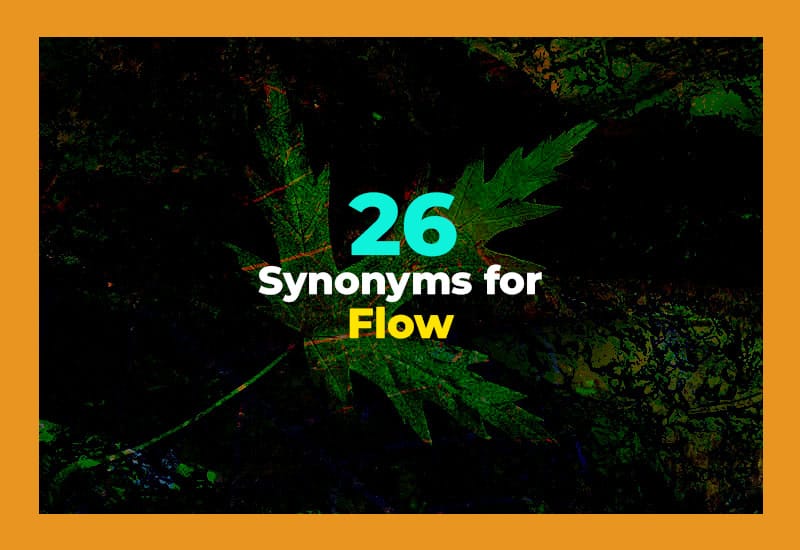You know that feeling when everything just moves smoothly, like water gliding over stones or ideas coming together perfectly? That's what flow is all about! Whether it’s the current of a river or the progress of a conversation, flow makes life feel natural and easy. Sometimes we need other ways to say "flow," whether for writing, talking, or just being creative.
1. Stream
A stream is a small, flowing body of water, usually fresh and moving steadily. We often see streams in nature, where water flows gently through the forest or alongside a trail. People use the word stream to describe anything that moves continuously, like ideas or music. For example, you might say, "The conversation streamed naturally between friends," meaning it moved without stopping. Streams can also mean digital content, like when you stream a movie online. This word gives a clear image of something moving smoothly, just like water in a tiny river.
2. Current
Current means a steady movement, especially of water or air. It's what makes rivers or oceans flow in a certain direction. For example, "The strong current made it hard to swim," shows how powerful the flow can be. The word can also describe a flow of ideas or emotions, like "She felt a current of excitement as the event started." Currents move constantly and keep things moving forward, making this word great when you want to show ongoing movement or energy.
3. Flux
Flux describes a continuous change or movement, especially when something is not stable. You might say, "The market is in flux right now," meaning it is always changing. In nature, flux refers to things flowing or shifting, like lava or water. It's a good word when describing a flow that's not just moving but also changing its form or direction. Think of flux as a flow full of energy and motion, always in action and never standing still.
4. Movement
Movement is the act of changing place or position, like people walking or leaves blowing in the wind. For example, "The dancer's movement was graceful and smooth," describes flow through body action. Movement can also describe changes in ideas or progress, such as "There's movement toward a new agreement," showing flow in talks or plans. This word is simple and clear, great for describing anything that goes from one place or state to another.
5. Circulation
Circulation means a continuous movement in a loop, like blood flowing through your body or air moving in a room. For example, "Good circulation keeps your hands warm," shows how flow helps life. Circulation also works for ideas or money, such as "There's a lot of circulation of new ideas in the office." It's a word that reminds us of flow that returns and repeats, keeping things alive and active.
6. Outpouring
Outpouring means a strong flow of emotions or things, like love, words, or support. For example, "There was an outpouring of kindness after the event," shows many people giving feelings or help all at once. It can also be about liquid or other materials flowing out suddenly. The word outpouring is perfect when you want to show a big, open, and powerful flow, like a burst of feelings or actions.
7. Drift
Drift means to move slowly and smoothly, usually without control or a clear direction. Think of a leaf drifting down a river or a cloud drifting across the sky. For example, "She drifted through the room, lost in thought," shows gentle, easy movement. Drift can also mean moving through life or ideas without a fixed plan. It's a calm, natural flow that feels soft and unforced.
8. Tide
Tide is the regular rise and fall of the ocean's water, but it also means a strong flow or movement of something, like people or events. For example, "A tide of excitement swept through the crowd," means many feelings moved like waves. Tides come and go, showing flow with a rhythm and power that can change everything around. The word tide works well when you want to show natural, repeating flow in life or nature.
9. Course
Course means the path something follows as it moves, like a river's course or the course of a story. For example, "The river changed its course after the storm," shows physical flow changing direction. It also describes the flow of events, like "The course of history was altered." Course is a clear way to talk about flow that follows a path or plan, helping things move from start to finish.
10. Surge
Surge is a sudden, strong flow, often of water or energy. For example, "There was a surge of waves during the storm," shows powerful, fast movement. Surge can also describe emotions or actions, like "A surge of anger took over him." It's a word full of energy and strength, perfect when flow is quick, intense, and forceful, not slow or gentle.
11. Discharge
Discharge means to release or send out something flowing, like water, electricity, or emotions. For example, "The factory discharged waste into the river," shows flow leaving one place. It can also mean feelings, like "She discharged her anger with a loud shout." Discharge often points to flow moving out freely or being let go, making it useful to describe outflow or release.
12. Progression
Progression means a steady flow forward, often in time or steps. For example, "The progression of the story was easy to follow," shows smooth flow in events. It can also mean growing or developing, like "There's a clear progression in his skills." This word highlights flow that moves forward in an organized, natural way, like climbing stairs or moving through a plan.
13. Passage
Passage means movement through a space or time. For example, "The passage of the ship through the canal was slow," describes physical flow. It also means moving through moments, like "The passage of time changes everything." Passage is a gentle, simple way to show flow going through places or periods, helping ideas or things move along.
14. Spill
Spill means liquid flowing out of a container accidentally or naturally. For example, "The water spilled onto the floor," shows liquid flow spreading. Spill can also be used for words or feelings, like "She spilled all her secrets." It's a word that shows flow that's uncontrolled or unexpected, often sudden and spreading wide.
15. Run
Run means to flow quickly, often used for liquids or crowds. For example, "The river runs fast after the rain," shows strong flow. It can also describe a series of events, like "The run of good luck lasted all week." Run is a simple, active word to show flow moving quickly and smoothly over or through something.
16. Sweep
Sweep means to move across or through an area smoothly and completely. For example, "The wind swept the leaves away," shows flow moving and carrying things. It can also describe emotions or ideas, like "A wave of sadness swept over him." Sweep is a word full of energy and movement, perfect for describing flow that covers or changes a space.
17. Cascade
Cascade means a small waterfall or something flowing down in stages. For example, "Water cascaded down the rocks," shows flowing water in steps. It also works for things like light, sounds, or ideas, such as "A cascade of laughter filled the room." Cascade gives the image of flow that falls or moves down gracefully and beautifully.
18. Ebb
Ebb means the flow of the tide going out or a decrease in something. For example, "The tide ebbed away from the shore," shows water flowing back. It can also describe emotions or energy, like "His enthusiasm began to ebb." Ebb is a gentle flow moving backward or getting smaller, perfect for showing retreat or decline.
19. Overflow
Overflow means liquid or something flowing beyond its container's limits. For example, "The river overflowed after heavy rain," shows water spilling out. It can also describe feelings or ideas, like "Her joy overflowed during the celebration." Overflow is a strong word for flow that can't be held back, spreading everywhere freely.
20. Gliding
Gliding means moving smoothly and easily, often without effort. For example, "The boat was gliding across the calm lake," shows peaceful flow. It can also describe movements like dance or flying, such as "The bird glided through the air." Gliding is a gentle, beautiful word that shows flow moving with grace and ease.
21. Emission
Emission means sending out something, like light, heat, or gas, flowing from a source. For example, "The car's emission caused pollution," shows flow leaving a source. It can also describe sounds or energy, like "The emission of light brightened the room." Emission is a word for flow that comes out or spreads from a point, often invisible but important.
22. Efflux
Efflux means the flowing out of something, often liquid or gas, from a place. For example, "The efflux of steam was visible from the pipe," shows flow leaving. It's a technical word often used in science to describe flow moving outward. Efflux focuses on the flow's exit or release from a source.
23. Fluxion
Fluxion is a fancy word for continuous flow or change, often used in math or science. For example, "The fluxion of water in the stream is constant." It shows movement and transformation together. It's great when describing flow that involves both moving and changing, like ideas or liquids in motion.
24. Dispersal
Dispersal means spreading things widely from a source, like seeds or crowds moving apart. For example, "The dispersal of seeds helped plants grow everywhere." It shows flow that moves outward and scatters. Dispersal describes flow that expands, covering new areas, often in nature or people.
25. Pour
Pour means to flow liquid out steadily, like water from a cup. For example, "She poured tea into the cup," shows smooth flow. It can also mean a flow of people or things, like "People poured into the stadium." Pour is a simple, everyday word for flow that moves steadily and freely.
26. Spread
Spread means to open or extend over a large area, like butter on bread or news in the world. For example, "The fire spread quickly through the forest," shows flow covering space. It also describes ideas or feelings, like "Rumors spread fast." Spread is a clear way to talk about flow moving outward to reach many places.

Final Thoughts
Flow and its many synonyms help us describe movement, change, and progress in fun ways. Whether you're talking about water, emotions, or ideas, these words make your language richer and more interesting. Next time you want to describe smooth or strong movement, try one of these great flow synonyms!









